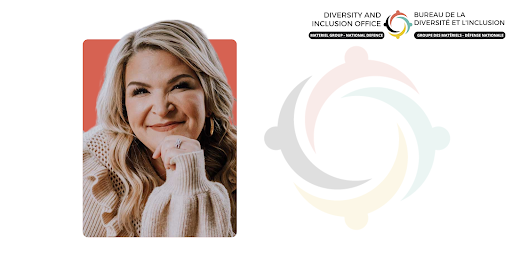Feeling Seen in a Disconnected World: A Conversation with Dr. Jody Carrington
Feeling Seen in a Disconnected World: A Conversation with Dr. Jody Carrington
On December 5, 2024, the Diversity and Inclusion Office (DIO), Materiel Group, National Defence hosted a conversation with clinical psychologist Dr. Jody Carrington and moderated by Samantha Moonsammy and Sarah Francescutti. In this event, open to all Defence Team and members across the Federal Public Service, participants asked questions to Dr. Jody on a range of topics including inclusion, accessibility, psychological safety, belonging and leadership. The event created a space for attendees to have courageous conversations and share their experiences openly and honestly.
Feeling Seen and the Loneliness Epidemic
Dr. Jody began the conversation by sharing what it means to “feel seen” in a disconnected world. She explained that “feeling seen” is a connection that goes deeper than simply having a shared like or dislike—it means having a shared understanding of one another’s experience.
It’s also more than interpersonal communication and team building; it’s a neurobiological necessity. Human brains are wired for connection with others, and everybody has the need to feel seen. Without it, people are lonely or unable to regulate themselves emotionally.
In fact, Dr. Jody argued, the ‘mental health epidemic’ should actually be described as a loneliness epidemic. 62% of people report feeling lonely in their workplaces, which in turn drastically increases turnover rates in that organization. So, making people feel seen in the workplace is more than a kind gesture: it’s a business imperative.
Emotional Regulation and Inclusive Leadership
Emotional regulation is the ability to keep one’s emotions in check in stressful situations or when others are upset or dysregulated. Dr. Jody explained that being able to emotionally regulate is the single greatest predictor of successful, inclusive leadership. That’s because emotionally regulated leaders can keep their cool under pressure, connect with their team, and help others regulate themselves as well. Being emotionally regulated allows us to have access to the best of other people and of ourselves
That also means that everyone can be an inclusive leader at all levels, because we all set the tone in our workplaces. And often, helping a dysregulated person can be as simple as asking them to tell you more about what’s bothering them or getting them a glass of water.
Helping Ourselves First
Unfortunately, most people in the present world are not emotionally regulated, including members in our workplaces. And if we are not okay, how can we do our best work for the Canadian public we’re meant to serve?
On this point, Dr. Jody was clear: while we cannot fix every issue that arises, we can help ourselves. Making sure that we are okay first, then making sure our teams are okay, will ensure that we can do the best work for all Canadians. By using the tools and advice Dr. Jody shared–and building our networks through initiatives like the Lifting as you Lead Mentoring Circles (LLMC) program–we can foster a healthier, more inclusive Federal Public Service and Defence Team for all.
